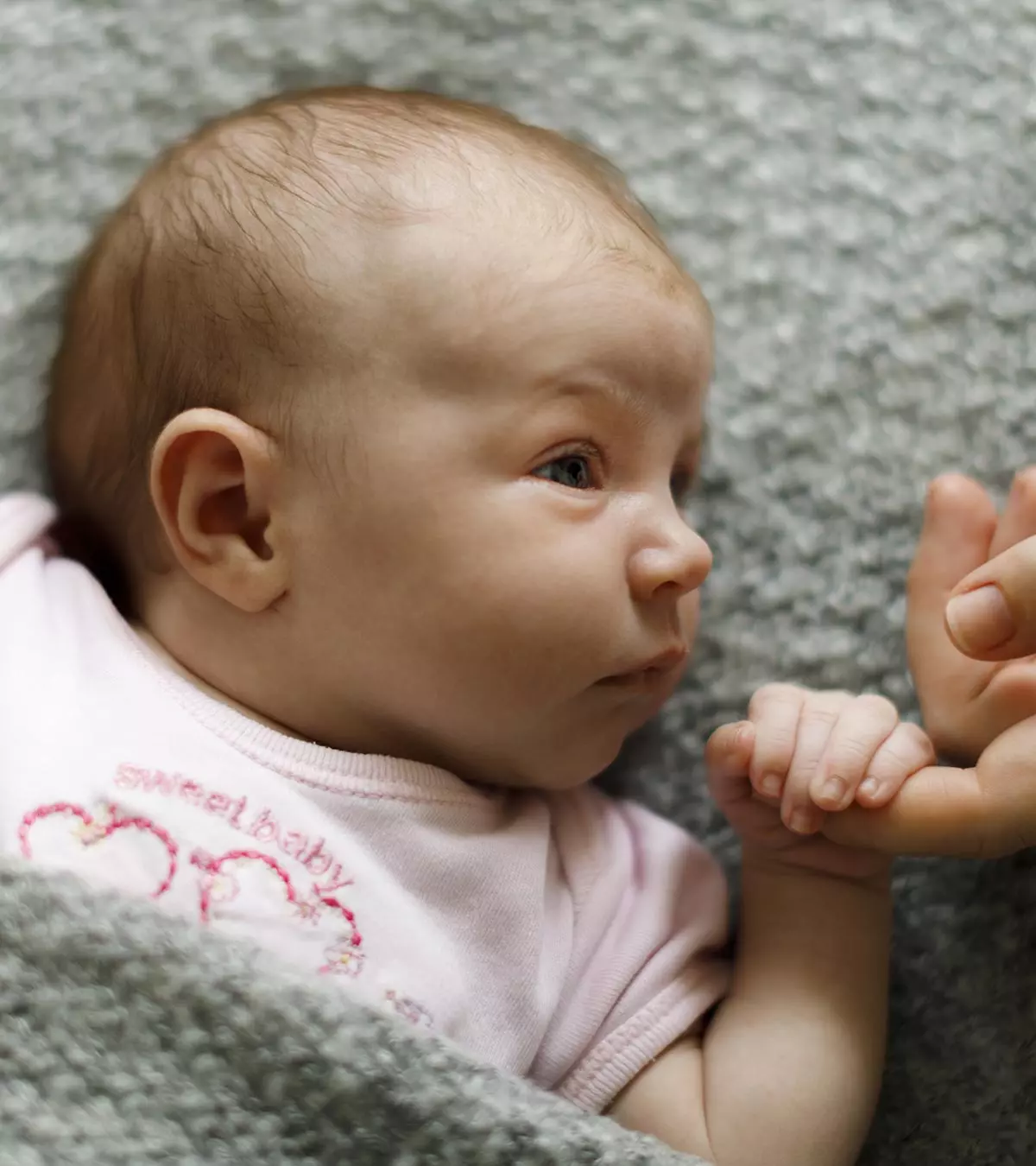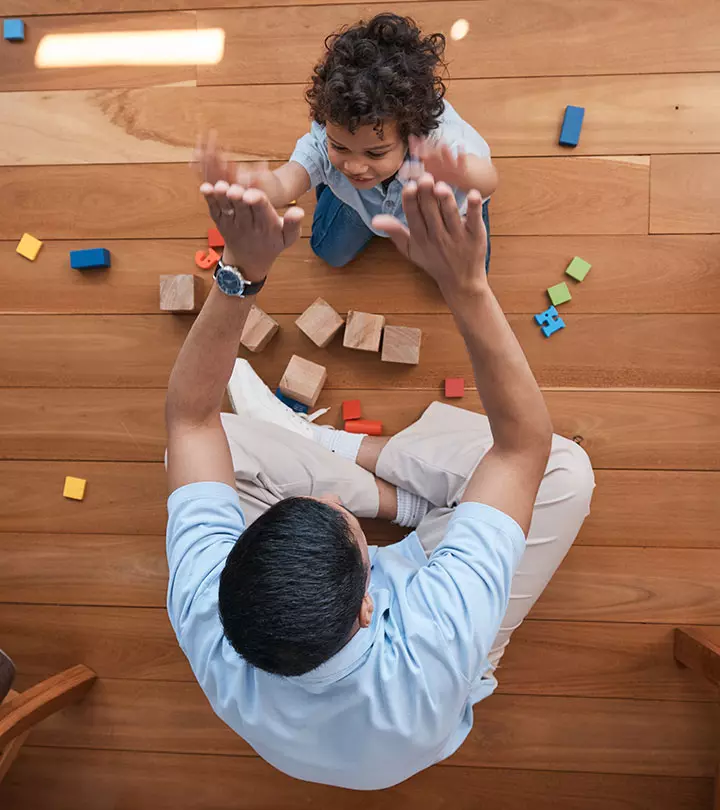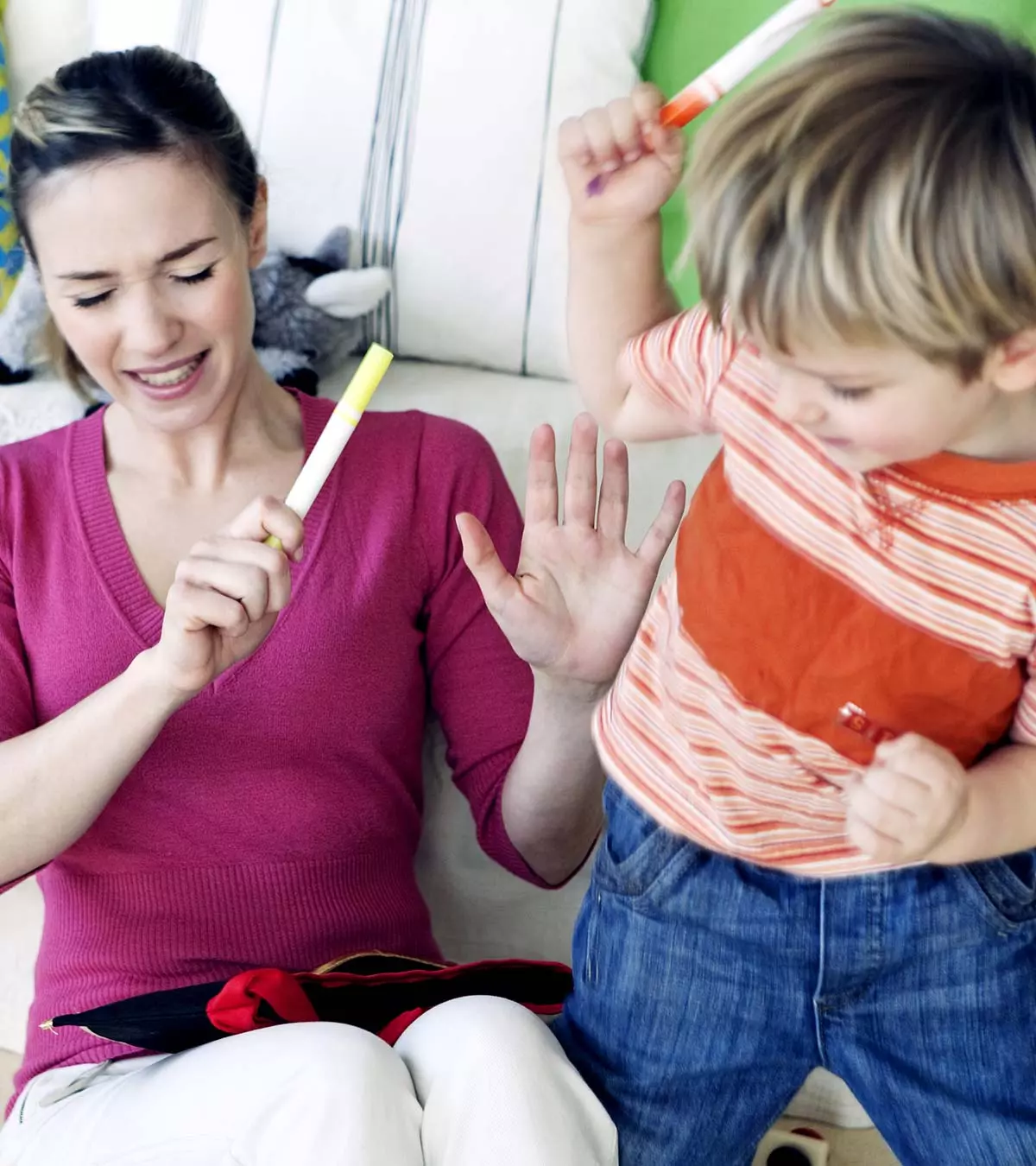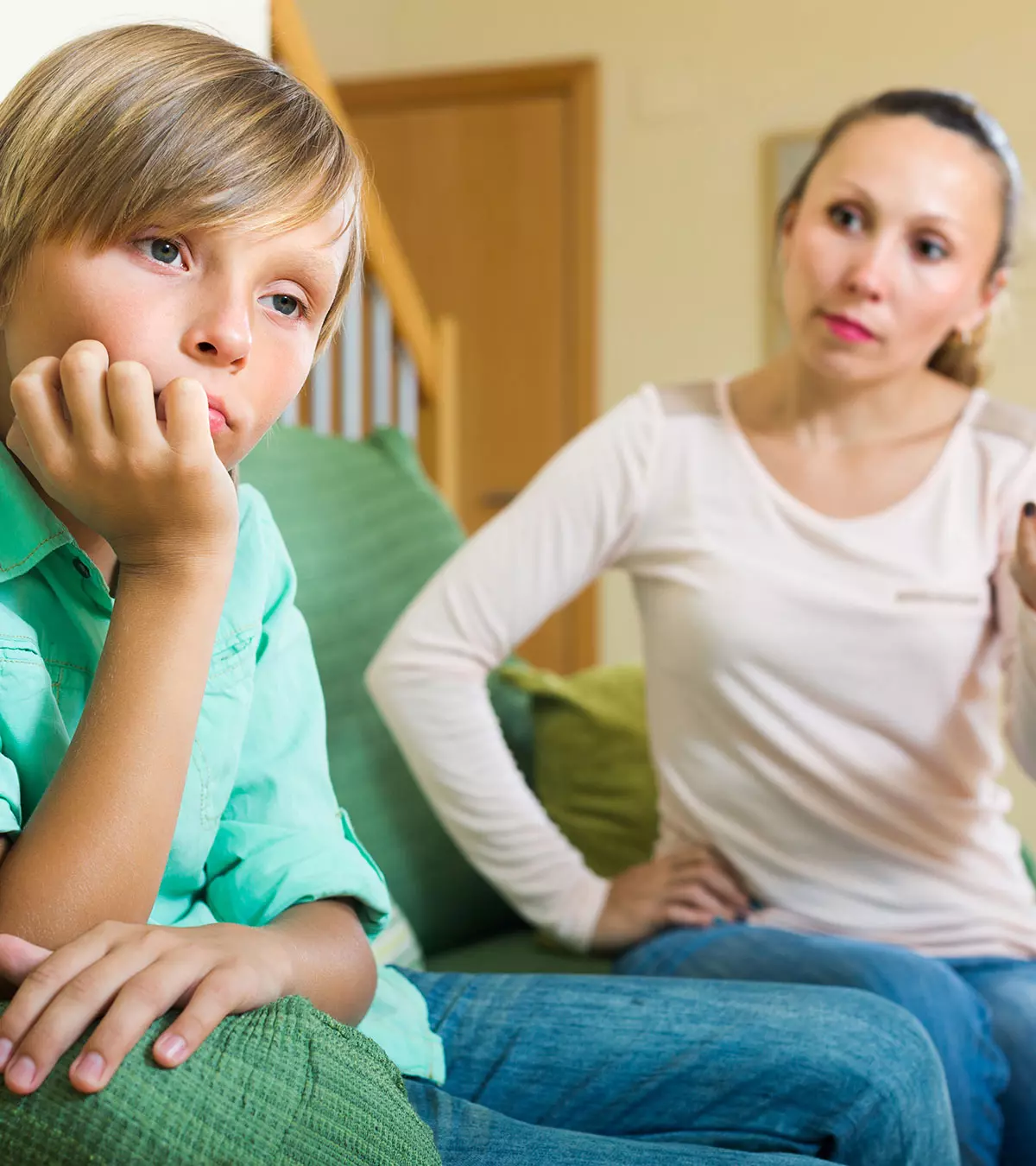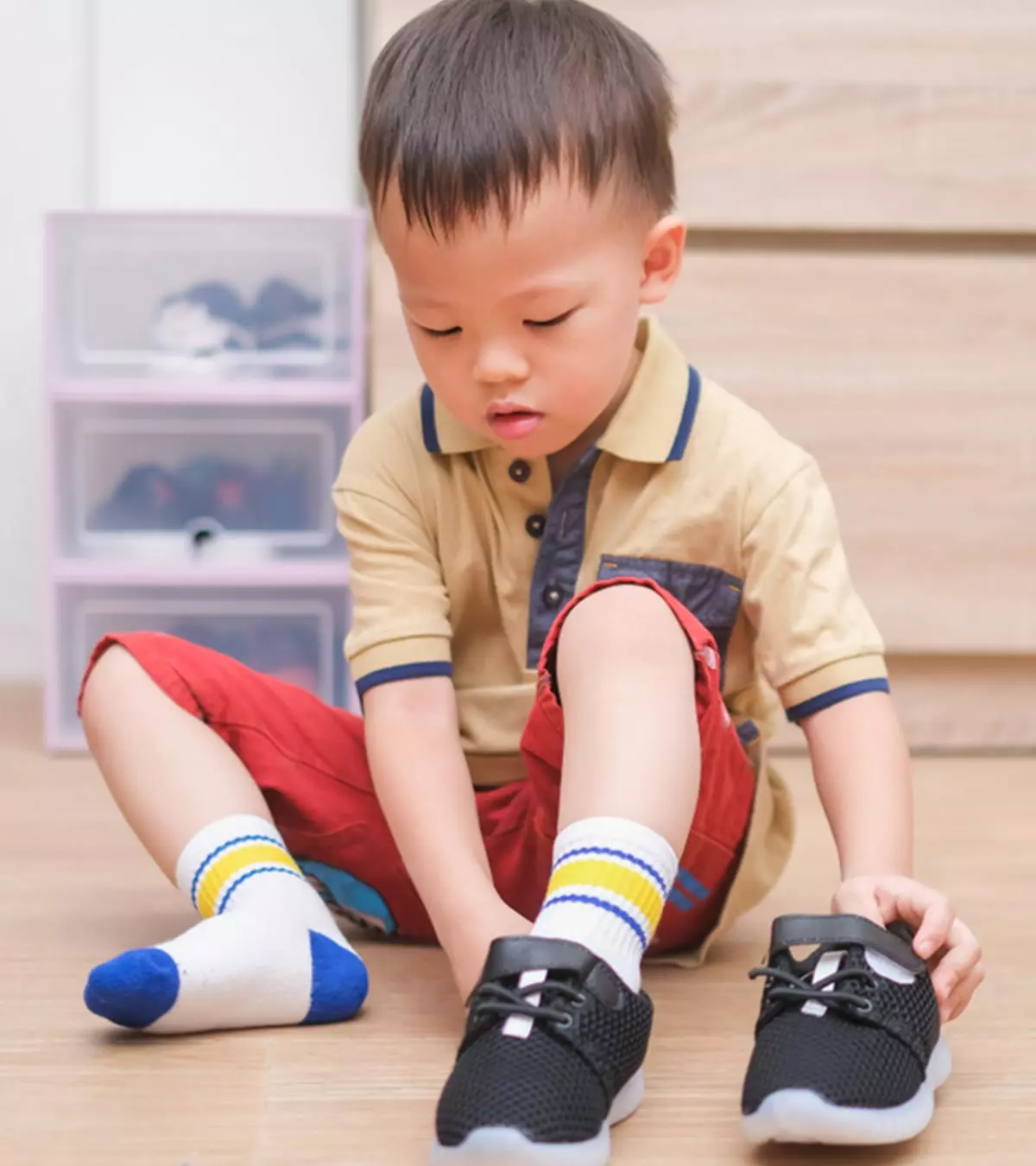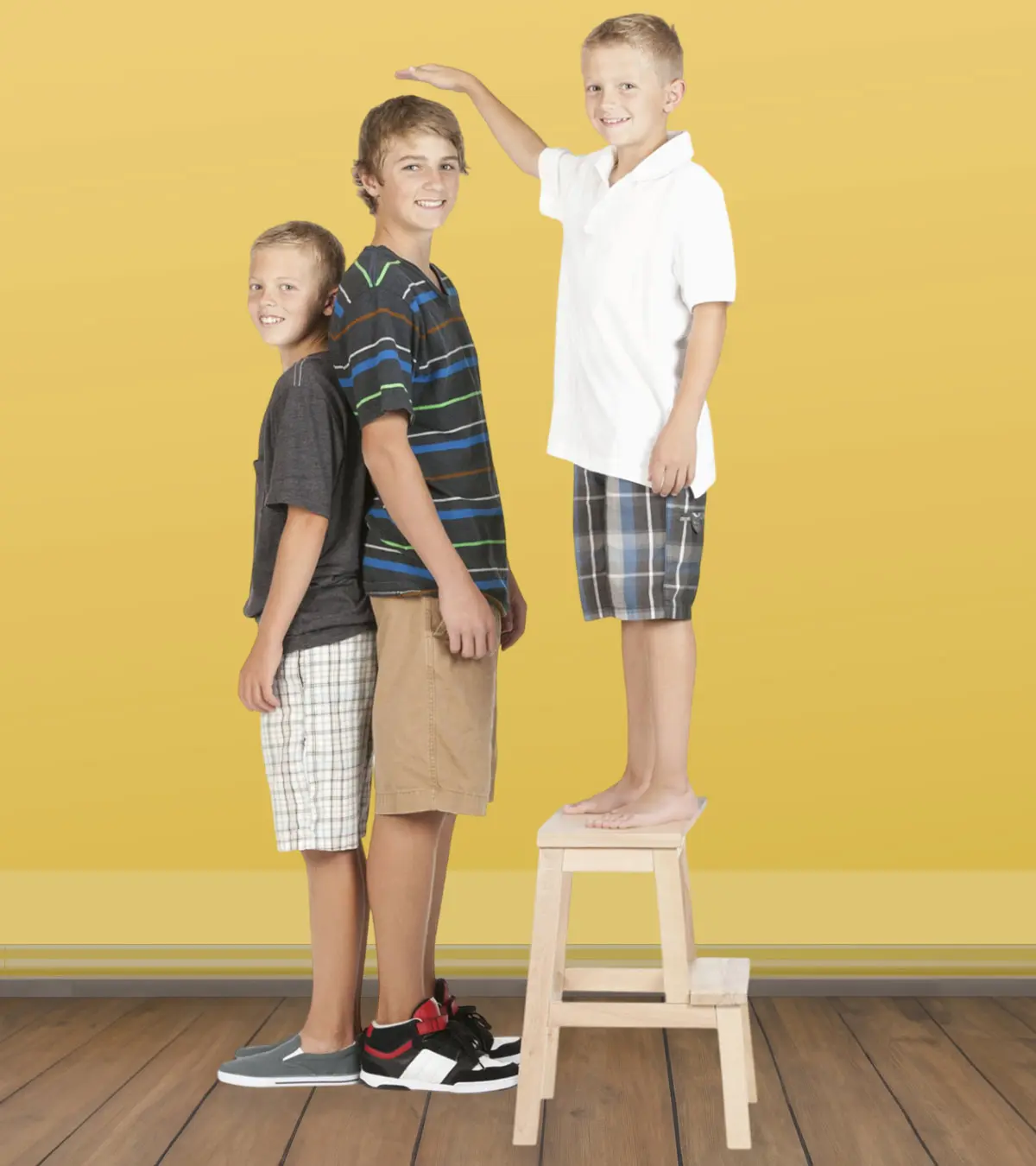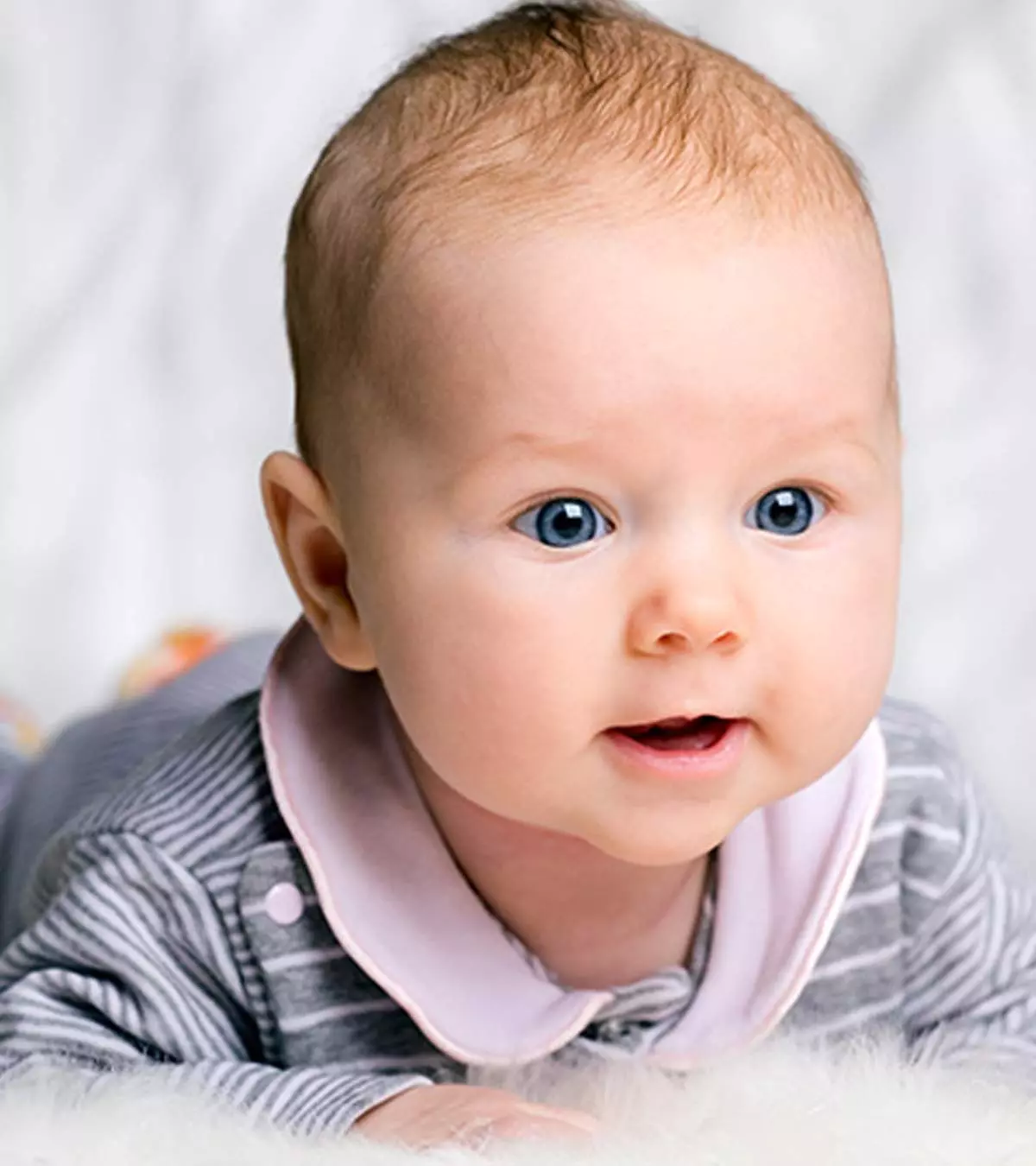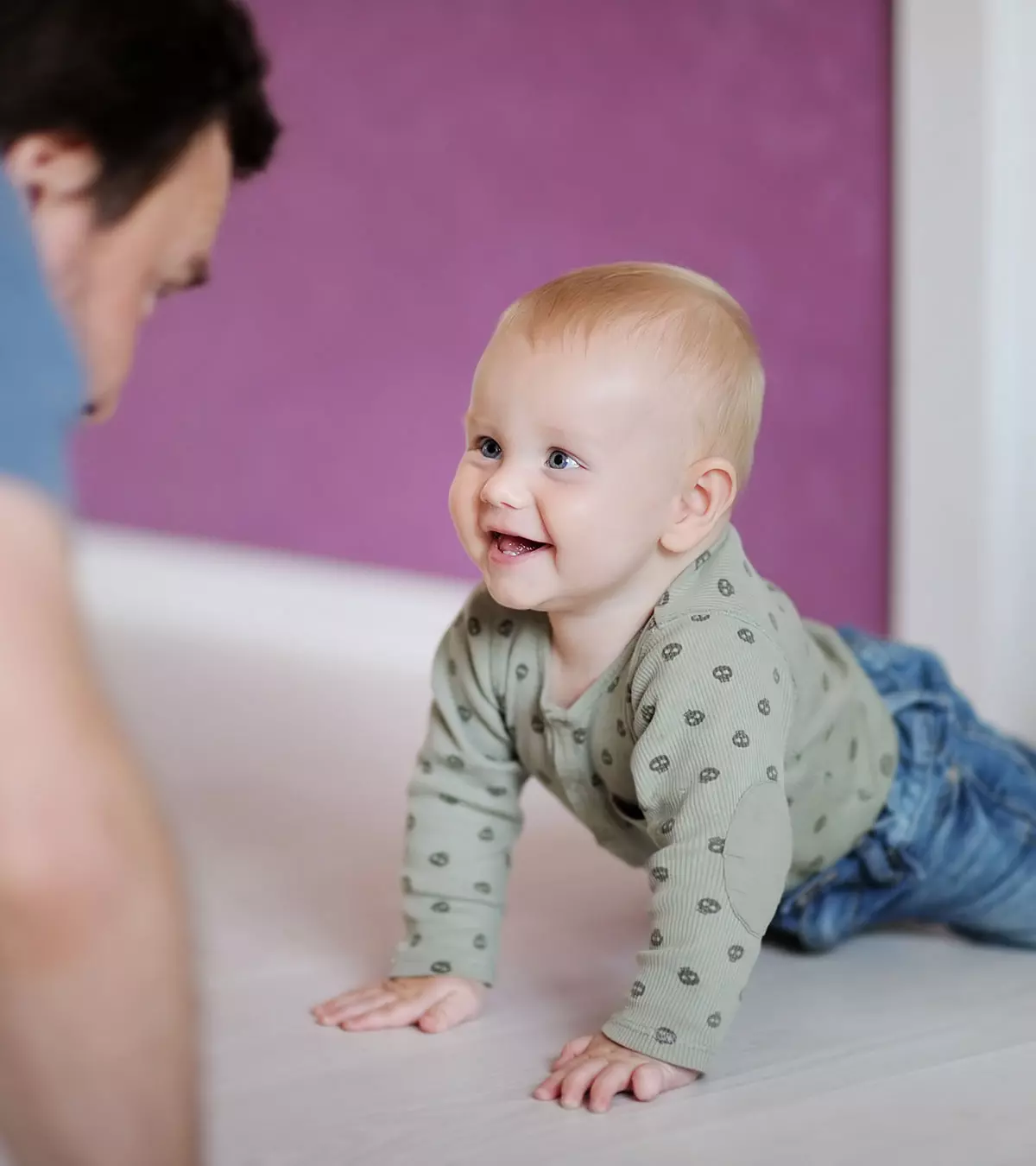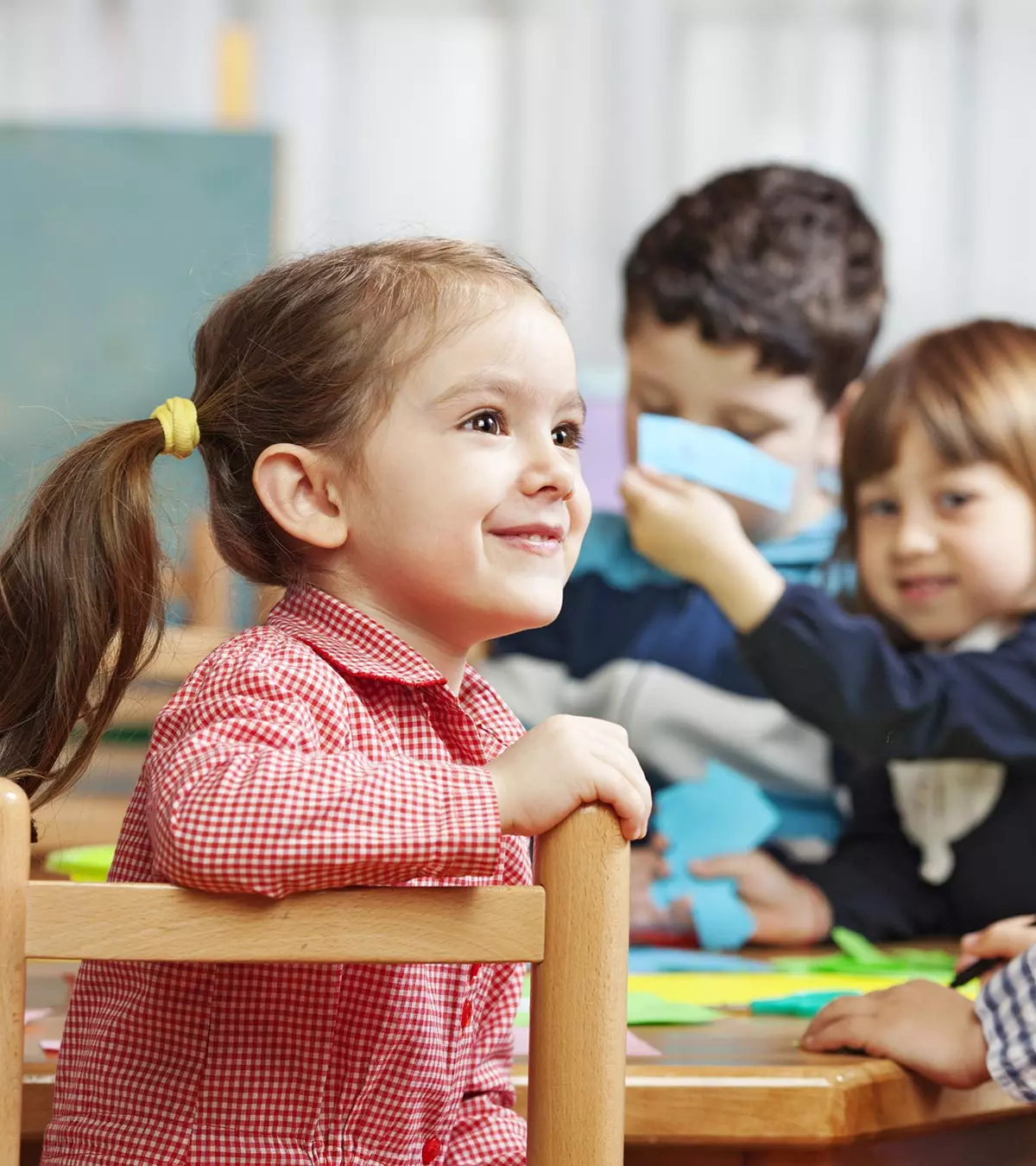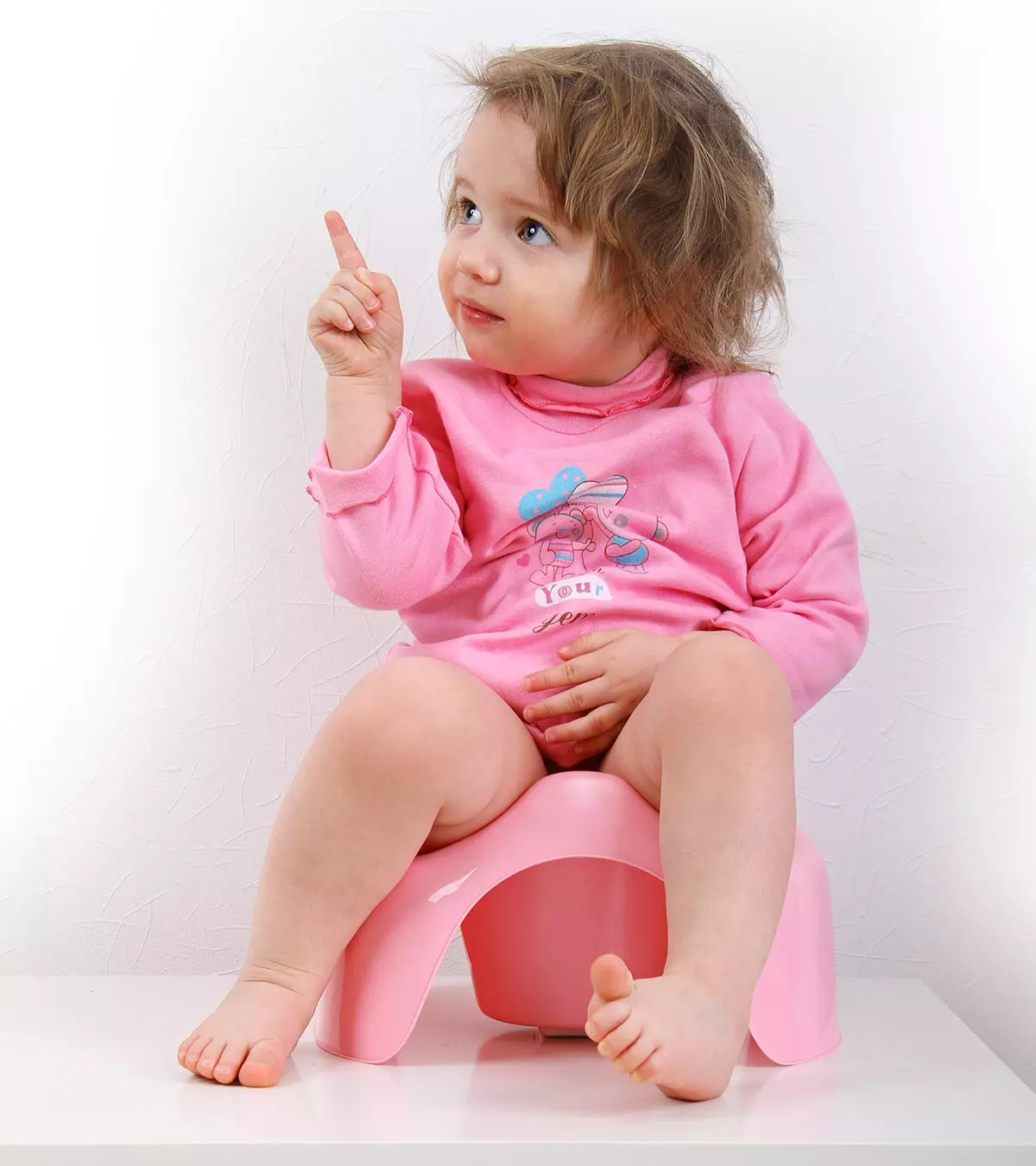
Image: Shutterstock

Babies develop with each passing day. By the time your baby is 16 months old, they attain several capabilities. The 16-month-old baby’s developmental milestones include walking around with baby steps. The baby may also run, climb, and jump.
Some babies of this age also start to utter at least two to three words, while the chatty ones may utter even more. Teething is also observed during this period. Read on to know more about the developmental milestones of your 16-month-old baby.
Key Pointers
- A 16-month-old baby is capable of following directions, walking independently, kicking balls, and walking backward.
- The baby is able to communicate her preferences and frequently expresses herself by saying “No”.
- Use a soft-bristled brush to clean all surfaces of your baby’s teeth, tongue, and the roof of her mouth.
- Set positive examples for your child to imitate and learn proper etiquette.
- Handle tantrums with patience and avoid displaying aggression, as young children learn from observing their environment.
16-Month-Old Baby Development Milestones
At this age, your baby is developing at a rapid speed. Scroll down as we list the 16-month-old milestones so that you can track your baby’s development.
- Your baby is quite the grown-up at this age and can follow different directions.
- They will be walking on their own. In fact, you may also find them walking backwards.
- They may be able to kick balls and jump with time as well as learn to climb.
 Do remember
Do remember- Language development takes a turn for the better at this age. They will gradually learn to string words to make phrases, such as, ‘I want this’ or ‘give me’.
- You can now hold basic conversations with them.
- They may learn to giggle when you make funny faces or tickle them gently. They are generally responsive to your actions.
- Be prepared; they will say “no” to you more often as they express their likes and dislikes.
- They will repeat the actions you approve of.
- Even though they are not ready to read, their attention span will start to increase as they will love to stare at pictures and point at them.
- Give them a crayon or a pencil to scribble.
- Their need for independence may be seen in instances such as they will want to feed on their own and try to hold the spoon.
- You can start toilet-training at this age.
Christine, a mother of two and a blogger, joyfully shares her son Lucas’s latest developmental milestones at 16 months. She says, “Luca just turned 16 months and has officially begun walking! I say it’s official because he now prefers walking over crawling. For the last month or so, he has been taking steps on his own but still preferred to crawl. For the last three months, he has been walking while holding our hands, and for about four months, he’s been standing up on his own and ‘cruising’ on furniture or anything he can hold on to (i).”
Each child takes their own time to achieve the milestone. Some may be faster in fine and gross skills development, others in mental or emotional development and still others in social skills development. There is no need for you to worry, even if your baby has not reached the expected milestones. You can speak to your doctor and ask if intervention of any sort is necessary.
Importance Of Oral Hygiene
Brushing begins at the 16th month of age. According to the American Academy of Pediatric Dentistry (APD), you must take your baby to a dentist for the first time when they are 6 months old. Here are some tips:
- You must be aware of the oral hygiene for your baby. The toothbrush you choose must be soft and meant for little ones.
- You may begin their oral hygiene routine with warm water. For the toothpaste, you need to wait until they are capable of rinsing and spitting.
- Don’t feel disappointed if your baby is not willing to brush. They will learn with time.
 Quick tip
Quick tipOther Developments
Your baby at this age is ready to say magic words like “thank you” and “please”. However, you must not push them at every instance to say these words. Every baby has their own pace of development.
- At this age, your Your will be curious and observe when people use such words and may try to copy them.
- Babies learn by imitating. You need to set good examples for your child to imitate and learn new etiquette.
- Playing is the core activity through which babies learn. Give age appropriate toys that can aid in their sensory exploration. Push toys like trucks and buses can encourage them to walk. Simple things like plastic boxes and wooden spoons can help them learn too.
- Watch your little one having fun for hours together with anything they get hold of at this age. Inexpensive bath toys such as nesting beakers are very popular among babies.
As A Parent
Parents play an important role in shaping a baby’s behavior.
Remember your baby considers you as a role model. So behave well around them. Here are the different ways you can help your baby:
- We understand that temper tantrums are hard to deal with. But they can become easier for you to handle if you understand what your baby wants and decide accordingly.
- Aggression is a natural human response, but the difference between you and your baby is that you have learned to handle it. Be calm and act right.
- To show their frustrations, your baby may throw things at you or their siblings. It is your responsibility to bring them under control .
- You may enjoy the simple pleasures of singing and reading out to them.
- Take your child for a walk outside regularly. This will provide them ample scope to explore the outside world.
- In case you are planning to get back to work, it is important that you organize your chores. Planning in advance and prioritization will help you spend quality time with your child.
- Help them become aware of their abilities and set simple rules.
Why Does Your Toddler Like To Repeat Things?
Repetition is one of the basic building blocks of early education. Moreover, it lends a sense of comfort to young children. They can improve on sensory exploration, enhance their language, get attention, be encouraged to express themselves, and even explore their surroundings. Parents may find it tiring to read the same book every day for a month, but a toddler knows the structure of the book and derives comfort from the routine (1). If they prefer reading the same book or listening to the same rhyme every day, do not refuse to repeat. Understand that repetitions are normal and also recommended so they learn and grow.
Frequently Asked Questions
1. What fine motor skills should a 16-month-old have?
A 16-month-old will usually display the fine motor skills of turning pages, using both the thumb and fingers in a coordinated manner, building a two-block tower, pointing at objects, placing or removing an object from a container, identifying and putting simple shapes into puzzles, and spontaneous scribbling (2).
2. Should I be worried if my 16-month-old isn’t talking?
A 16-month-old baby will usually imitate the sounds made by parents and try saying words, such as “Momma” and “Dadda.” Consult a pediatrician if you do not notice your baby talking or babbling much (3).
3. What is considered talking for a 16-month-old?
Babbling, including single consonant sounds such as p, b, m, d, or n, using simple nouns, saying words such as “uh-oh,” “wow,” or “no,” and saying “Momma” and “Dadda” are considered talking for a 16-month-old (3) (4).
4. How much sleep does a 16-month-old need?
A 16-month-old needs around 11 to 14 hours of sleep, including naps. As toddlers start walking and talking, they may transition to fewer or shorter naps, typically one per day, and more nighttime sleep. Establishing consistent routines and positive reinforcement is crucial for a good sleep routine (5).
5. What should be the feeding schedule for a 16-month-old baby?
A 16-month-old feeding schedule involves offering a variety of family foods, ensuring each meal is nutritionally packed. They can consume three-quarters to one cup of food three to four times daily, accompanied by one to two snacks between meals. If not breastfeeding, the baby may require more frequent meals (6). It’s important to provide a well-balanced and nutritious diet to support their growth and development.
When babies attain 16 months, they are at the end of infancy and gradually move towards toddlerhood. Your baby could be walking, giggling, and trying to self-feed themselves and have basic conversations with you at this age. However, it is important for you as a parent to follow the necessary safety measures while at home or outdoors to keep your baby safe at all times. Spend time, go for walks, and read and sing to your baby to promote their overall growth. Nevertheless, if you are concerned about your 16-month-old baby’s development, you may speak to their pediatrician.
Infographic: 16-Month-Old Baby Development Milestones
16-month-old babies are at an exciting stage of development as they start acquiring new abilities rapidly. The infographic below details the milestones your little one may have attained by this month; remember to encourage their development by providing a safe and stimulating environment. Also, get involved in your baby’s growth to enjoy watching them grow and reach new milestones in your presence.
Some thing wrong with infographic shortcode. please verify shortcode syntaxMoms tell us about your experience with your baby development at 16 months in the comment section below.
Personal Experience: Source
MomJunction articles include first-hand experiences to provide you with better insights through real-life narratives. Here are the sources of personal accounts referenced in this article.
i. Luca’s 16 Month Old Update and Milestoneshttps://christinecovinoblog.com/16-month-old-update/
References
- The wonder of repetition in childhood development.
https://www.npr.org/2025/07/14/1187847461/the-wonder-of-repetition-in-childhood-development - Developmental Milestones: Fine Motor Skills and Visual Motor Skills.
https://www.choc.org/userfiles/file/Rehab-Developmental%20Milestones%20final.pdf My Little One Isn’t - Talking—Should I Be Worried?
https://healthcare.utah.edu/the-scope/shows.php?shows=0_6ea126lf - Speech and language development (from 12 to 24 months).
https://www.gosh.nhs.uk/conditions-and-treatments/procedures-and-treatments/speech-and-language-development-12-24-months/ - How Much Sleep Your Kids Need: Recommendations by Age
https://health.clevelandclinic.org/recommended-amount-of-sleep-for-children - Feeding your baby: 1–2 years
https://www.unicef.org/parenting/food-nutrition/feeding-your-baby-1-2-years
Community Experiences
Join the conversation and become a part of our nurturing community! Share your stories, experiences, and insights to connect with fellow parents.
Read full bio of Dr. Mubina Agboatwalla
Read full bio of Jessica Albert
Read full bio of Rohit Garoo
Read full bio of Vibha Navarathna







